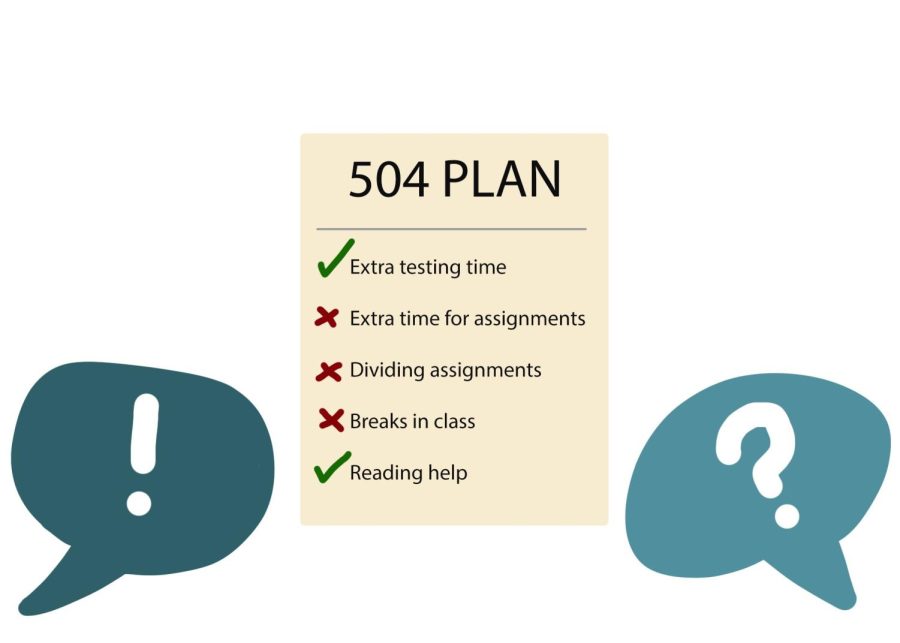Challenges persist with receiving, implementing 504 plans
While 504 plans can be obtained for free, the process and implementation of them can be difficult, students say.
May 23, 2023
504 plans present students with disabilities more opportunities for academic success through increased individual and educational support. However, the road to receiving and implementing accommodations can be long and rough for some, with many students facing challenges during the process.
Section 504 of the Rehabilitation Act of 1973 is a federal law that prohibits discrimination against students with disabilities. Everything from walking issues, to learning challenges is covered by this federal law and extra support is provided to students at no cost. Accommodations are assigned to students in accordance to specific guidelines which can sometimes conflict with student interest.
“[At first] I asked for chunking, which is moving assignments and separating them into smaller portions to make it easier to manage,” junior Brianna McCray, who has a 504 plan, said. “I didn’t get that. I also asked for extended time and that was also [initially] denied.”
McCray wanted a 504 plan and accommodations in order to improve their grades. The process began in freshman year and only recently, in junior year, did McCray receive extended time.
“It was honestly kind of difficult,” McCray said. “It took a while. I had to go to [the student coordinator] multiple times and have multiple meetings with my mom to get things actually going. Before that, I just went in and repeatedly asked for accommodations.”
Other students, such as junior Eleanor Welty, have faced similar problems in gaining accommodations within the school system. Welty was diagnosed with dyslexia in first grade, but the problem was only recognized by the school system in fifth grade.
“My mom had to fight the school at the time to get any sort of acknowledgement that I was in need of help,” Welty said. “They called her a helicopter parent (a parent that is overly involved in their childrens’ experiences) for making sure I could do well in school, which is ridiculous.”
Once the 504 plan and accommodations were received, both McCray and Welty believe that miscommunication hindered implementation.
“There’s no one telling you how [accommodations and plans] happen or that you have to go ahead and [be proactive],” Welty said. “How am I supposed to know to advocate for myself if I’m not even being told I have to do it? I’ve gone through so much to get my 504 plan already, I just assumed it’d be applied to everything.”
While teachers legally have to follow their students’ 504 plans, it can be difficult to manage, especially with a large number of students.
“We have a class in Schoology that lists all of the students’ accommodations,” math teacher Peyton Williams said. “We usually get [the information] at the beginning of [the] year and then I just go through and see who has them for the most part. Usually my students will tell me because it’s a lot, and it’s hard to remember. We have 120 students and [teachers have to] know who has what.”
Williams encourages students to speak up about their accommodations, but acknowledges the difficulty they might have in doing so.
“I know some students are very like ‘I have accommodations and this is what has to happen,’” Williams said. “Others kind of don’t want to acknowledge it. I try to be respectful of that.”
McCray knows communication with teachers is necessary, but this doesn’t make the process any easier.
“It’s just intimidating,” McCray said. “I know I have to speak to my teachers and teachers know they have to follow the law.”
While intending to be useful by offering help and support to students with disabilities, 504 plans can sometimes make students feel alienated.
“I remember being pulled out of classes because of my 504 plan, because I got accommodations,” Welty said. “It makes you feel isolated and different, like you’re not as smart as the rest because it’s something you need to do well on tests. It’s very isolating and almost makes you feel outcasted.”
Williams tries to make her class comfortable and welcoming for students, so when there are problems, there is a safe place to resolve them, regardless of accommodations.
“Let’s be honest, traditional school doesn’t work for a lot of people,” Williams said. “It’s a lot of structure and there’s things other than just learning happening in school that are very impactful. I just try to make sure that everyone feels comfortable in my class and if they do have a problem, they can be open to saying ‘listen, I need to be out of here for a minute or I need to go talk to the counselor.’ I definitely recognize that because we all need to just step away sometimes.”







